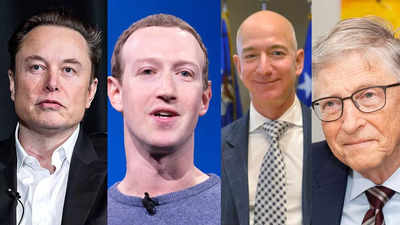While many believe formal education is crucial to success in the business world, the paths of the world’s richest men tell a more complex story.
From Bill Gates to Elon Musk, the educational journeys of these billionaires reveal that success can come from various educational backgrounds, including prestigious degrees and college dropouts.
Bernard Arnault, who recently became the world’s richest person with a net worth of $221 billion, exemplifies the traditional route. He holds an engineering degree from École Polytechnique, France’s leading engineering school. Arnault’s academic background aligns with his role as chairman and CEO of LVMH, the luxury goods giant.
Elon Musk, the second richest person globally with a net worth of $198 billion, has a more unconventional educational history. Musk attended Queen’s University in Ontario before transferring to the University of Pennsylvania, where he earned degrees in physics and economics. Despite being accepted into a Ph.D. program at Stanford University, Musk dropped out just two days later to pursue opportunities in the emerging tech industry, leading to his success at Tesla and SpaceX.
Jeff Bezos, another tech titan, began his educational journey at Princeton University, where he initially studied physics before switching to electrical engineering and computer science. Bezos, who founded Amazon from a garage, is now worth $193.9 billion. His formal education in science and technology played a significant role in his ability to build and scale Amazon into one of the world’s largest companies.
Mark Zuckerberg, the mastermind behind Facebook, also followed a non-traditional path. Zuckerberg was a student at Harvard University, majoring in psychology and computer science when he developed Facebook. Recognizing its potential, he dropped out in 2005 to focus on expanding the social network, which has since become a global phenomenon.
Larry Ellison, co-founder of Oracle, showcases yet another unique educational story. Although Ellison enrolled in the University of Illinois and later the University of Chicago, he did not complete his degree. Despite this, he built Oracle into a software powerhouse, amassing a net worth of $143.8 billion.
Warren Buffett, often called the “Oracle of Omaha,” faced educational challenges early on, including a rejection from Harvard Business School. However, he persevered, earning a BSc in Business Administration from the University of Nebraska and later an MSc in Economics from Columbia Business School. Buffett’s education, coupled with his relentless pursuit of knowledge, has been instrumental in his success as one of the world’s wealthiest investors.
Bill Gates, co-founder of Microsoft, was a National Merit Scholar and enrolled at Harvard University for mathematics and computer science. Like Zuckerberg, Gates chose to leave Harvard after two years to start Microsoft, a decision that led him to become one of the richest and most influential people in the world.
Larry Page, co-founder of Google, completed his undergraduate degree in computer engineering from the University of Michigan and later earned a master’s degree in computer science from Stanford University. Page’s academic achievements laid the foundation for the development of Google, now a cornerstone of the digital age.
These stories illustrate that while formal education can provide valuable knowledge and skills, it is not the sole determinant of success.
The world’s richest men have followed diverse educational paths, demonstrating that innovation, perseverance, and the ability to seize opportunities are equally critical in achieving extraordinary success.
Whether through completing prestigious degrees or leaving college to pursue entrepreneurial dreams, these billionaires have all carved unique paths to the top.











